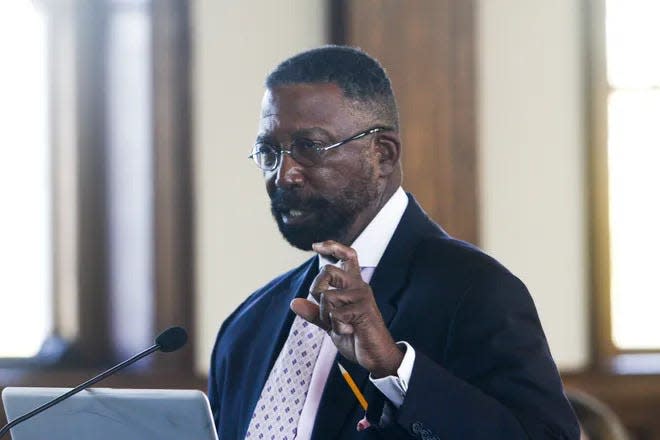Hopewell treasurer on criticism in report: 'Internal controls are lacking outside of' her office
HOPEWELL – The city’s treasurer is responding to allegations of not cooperating with City Council and the firm it hired to reboot the city’s financial-reporting system, saying that the roles are reversed in that it was the city and the firm rejecting her overtures of assistance.
Shannon Foskey accused the advisory firm of violating Virginia state code governing the separation of duties between her constitutionally elected office and the city by pushing Hopewell to change its charter that would move some accounting assignments into Hopewell’s finance department. She also said some city departments and Hopewell Public Schools were taking liberties with their money responsibilities to sign and send checks without her office’s knowledge, and that was escalating the crisis issue.
In a lengthy statement released late Wednesday afternoon, Foskey focused on points that she said were at the core of Hopewell’s current fiscal crisis – city employees’ lack of familiarity with and training on the MUNIS system Hopewell uses as its ledger, employees using workarounds to cover that lack of MUNIS experience, and an overall lack of communication among all departments on paying bills and collecting money.
In response, the founder of the advisory firm said that he was “a bit surprised” by Foskey’s statement and added that he would address the majority of those concerns with her privately. Robert Bobb did say, however, that the lack of communication Foskey cited was a two-way street, and simply ignoring the issues based on past performances was not best for business.
“We can’t bury our heads in the sand and not address those issues,” Bobb said.
A job 'lending' agreement
The crux of the Foskey-RBG disagreement focuses on a Memorandum of Agreement the group drafted where Foskey would lend her office’s accountant to the city finance department to assist in the system reboot until the city can hire its own. At its meeting on March 12, council adopted the agreement after hearing from RBG that Foskey was reticent to accept it.
Foskey said she saw that original agreement as an attempt to blur the division of money-handling duties between the treasurer’s office and the city.

The treasurer is a constitutional officer elected directly by their locality’s voters. While on the surface a city employee, that position and staff are a separate entity who are paid through the Virginia Compensation Board.
According to the state constitution, treasurers’ duties include:
managing the banking and investment relationships of the locality;
reconciling bank and investment accounts;
reporting financial information to the City Council and Virginia Auditor of Public Accounts; and
performing all phases of public accounting in compliance with state and federal requirements.
The office, Foskey said, runs on the authority “of the Constitution of Virginia, the Code of Virginia, case law, court decisions and opinions of the Attorney General.” As such, she added, her office is well-equipped to handle whatever happens.
“The Treasurer and her staff are quite capable of performing their duties,” Foskey said, “and are eager to accept any necessary assistance/guidance.”
She claimed she offered to fine-tune the MOA, but council and RBG “rejected” that offer. Instead, Foskey said, RBG recommended on March 12 that Hopewell ask the Virginia General Assembly to change the city charter shifting the accounting duties permanently from her office.
“It is important to note that, the Bobb Group, which has charged the city $2,300,000 for their services to date, recommended an outright transfer of a State Compensation Board funded employee in the independently elected constitutional office of the Treasurer to the City’s finance department, which violates Virginia law (VA Code § 15.2-1600),” Foskey wrote in her statement.
She added, “Virginia law is very clear regarding the authority of the independently elected constitutional office of the City Treasurer.”
Bobb said his firm’s recommendations about the use of the treasurer’s account are not unique for Hopewell. Other jurisdictions, including Colonial Heights and Prince George County, have similar setups to what was brought up in the MOA, and they are not having any issues.
Missing internal controls
Foskey also took issue with having part of the blame for Hopewell’s money mess placed at her office’s doorstep, saying she inherited the problems from her predecessor, who in turn inherited them from her predecessor. She said there had been an historical lack of communication between the treasurer and the city that only started to turn around last November when the finance department agreed to meet with her once a month.
“Internal controls are lacking outside of the treasurer’s office,” Foskey said.
That, she added, was discovered by an audit the Virginia Treasurers Association did of Foskey’s office at her request to identify needs. Treasurers from Chesterfield and Wise counties – both certified public accountants, she noted – came in at no cost to Hopewell and helped her get the office on track.
During that visit, which she claimed her colleagues “were very impressed” with what they saw, Foskey said she learned that some city departments and the Hopewell school system were acting “independently” from her office on some transactions.
She said the departments and the school system are not confirming with her office that there are enough funds in the city accounts before issuing checks. She also said they were using “a mechanical signature of the treasurer” to process the checks without her authorization.
“Recently, the Treasurer of Chesterfield County received two checks from the City of Hopewell schools’ division that were mechanically signed with the previous Treasurer’s signature, not with the signature of the current Treasurer," Foskey said. “When inquiring about it, the schools’ division told the Chesterfield Treasurer that they saw no problem with using an outdated signature and that the checks should be deposited.”
In his interview with The Progress-Index, Bobb said he was aware of that claim. He said he told Foskey he would be “more than happy to convene a meeting” with Foskey and the VTA to pursue that further. According to Bobb, Foskey never followed up on that.
Bobb said Foskey needs to stop bringing up the past as the reasons for the current state and focus on the present and future. Foskey, he noted, has been on the job for almost two years “and has had some successes.”
He said Foskey had many opportunities to bring up MOA concerns before council both in closed and open sessions, so he was surprised to read her allegations.

“We’re here to solve problems, not sweep them under the table,” Bobb said. “We don’t have a lot of time for conversations about what happened before.”
Foskey said she ultimately signed the original MOA drafted by RBG “despite considering it to be at odds with general law and without legal effect.” She said she did so because it was in the best interest of the city.
“I intend to work with the finance department towards the implementation of needed changes for the betterment of the city,” she said.
Bill Atkinson (he/him/his) is an award-winning journalist who covers breaking news, government and politics. Reach him at batkinson@progress-index.com or on X (formerly known as Twitter) at @BAtkinson_PI.
This article originally appeared on The Progress-Index: Hopewell treasurer responds to criticism of office in report

